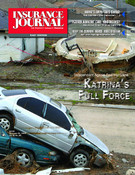Does the world seem to be careening from one crisis to another these days or is it all hype by news outlets?
Unfortunately, it’s not hype; it’s the real world. Not a day goes by without reports of terrorist threats and attacks somewhere around the globe. The AIDS epidemic seems to be worsening in certain parts of the world. Hurricane Katrina victims, the entire city of New Orleans and communities along the Gulf Coast are still struggling to put their lives back together, as are those who managed to survive the Indian Ocean tsunami a years ago and the giant earthquake in Pakistan and Kashmir just two months ago.
And now the world is being warned of yet another potential crisis. A few weeks ago, the U.S. Center for Disease Control and Prevention (CDC) advised that avian flu is just “one step away” from being a pandemic. Speaking at an event sponsored by broker Marsh and its affiliates Kroll and Mercer, Dr. Toby Merlin of the CDC laid out the bare facts. Of the 135 known human cases, the mortality rate is 50 percent. “It is quite lethal as we see it now,” he said.
There is not a human influenza pandemic at this time, nor can it be said for sure that one is imminent. However, the new strain of influenza virus found in birds in Asia can infect humans. If the virus mutates in certain ways, it is possible it could lead to a pandemic.
Because this threat does exist, it is important for businesses to be knowledgeable about the risks associated with the threat and, in turn, to be adequately prepared for the possibility of a pandemic. As with any of the risks that our country faces, including natural disasters and the ongoing possibility of another terrorist attack, all segments of society must be prepared. President Bush, the CDC, the Departments of Commerce, Health and Human Services, and Homeland Security are calling upon businesses to focus on the need for planning within their own organizations for the possibility of an influenza pandemic.
In order to ensure maximum preparedness, businesses should develop specific plans to protect their employees and maintain operations during a pandemic. Companies that provide critical infrastructure services, such as power and telecommunications, also have a special responsibility to plan for continued operation in a crisis and should plan accordingly. As with any catastrophe, having a contingency plan is essential.
The CDC has developed materials including a checklist to assist in the planning for a pandemic outbreak. For more information, visit the federal government’s Web site at www.pandemicflu.gov.
The criticisms that the flu warnings are mere hype are themselves the worst kind of hype because they erode hope. While preparing, substitute hope for hype and keep praying that the pandemic crisis checklist is never needed.
Was this article valuable?
Here are more articles you may enjoy.


 US Appeals Court Rejects Challenge to Trump’s Efforts to Ban DEI
US Appeals Court Rejects Challenge to Trump’s Efforts to Ban DEI  The $3 Trillion AI Data Center Build-Out Becomes All-Consuming for Debt Markets
The $3 Trillion AI Data Center Build-Out Becomes All-Consuming for Debt Markets  A 10-Year Wait for Autonomous Vehicles to Impact Insurers, Says Fitch
A 10-Year Wait for Autonomous Vehicles to Impact Insurers, Says Fitch  ‘Structural Shift’ Occurring in California Surplus Lines
‘Structural Shift’ Occurring in California Surplus Lines 


